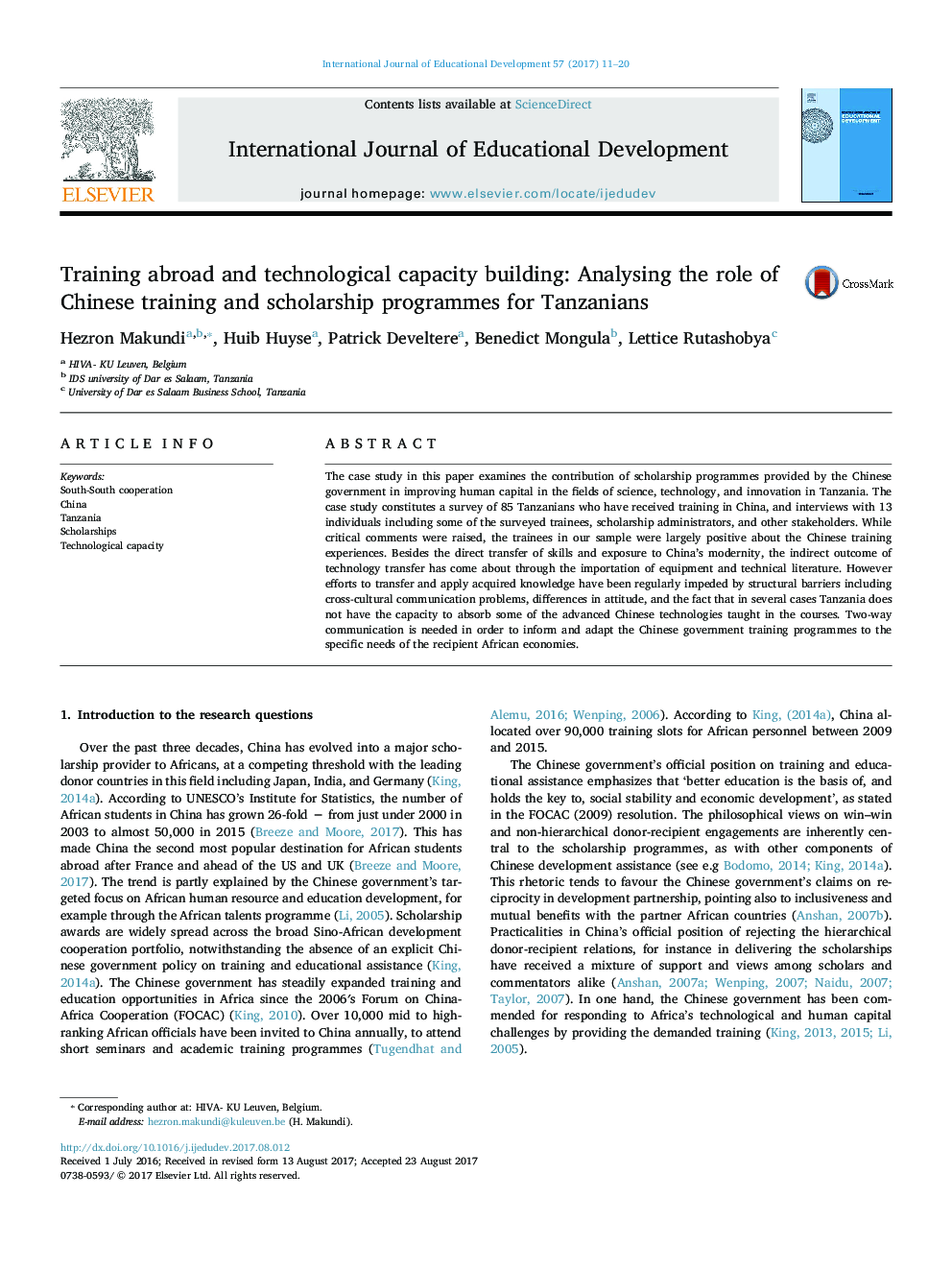| کد مقاله | کد نشریه | سال انتشار | مقاله انگلیسی | نسخه تمام متن |
|---|---|---|---|---|
| 4938451 | 1435082 | 2017 | 10 صفحه PDF | دانلود رایگان |
عنوان انگلیسی مقاله ISI
Training abroad and technological capacity building: Analysing the role of Chinese training and scholarship programmes for Tanzanians
ترجمه فارسی عنوان
آموزش در خارج از کشور و ایجاد ظرفیت های تکنولوژیکی: تجزیه و تحلیل نقش برنامه های آموزشی و بورس تحصیلی چینی برای تانزانیا
دانلود مقاله + سفارش ترجمه
دانلود مقاله ISI انگلیسی
رایگان برای ایرانیان
کلمات کلیدی
همکاری جنوب و جنوب، چین، تانزانیا، بورس تحصیلی ظرفیت فن آوری،
ترجمه چکیده
مطالعه موردی در این مقاله اهمیت برنامه های بورس تحصیلی ارائه شده توسط دولت چین در بهبود سرمایه انسانی در زمینه علوم، فن آوری و نوآوری در تانزانیا را مورد بررسی قرار می دهد. مطالعه موردی یک نظرسنجی از 85 تانزانیایی است که در چین تحصیل کرده اند و مصاحبه هایی با 13 نفر از جمله برخی از کارآموزان مورد بررسی، مدیران بورس تحصیلی و سایر سهامداران انجام شده است. در حالی که نظرات انتقادی مطرح شد، دانشجویان نمونه ما در مورد تجربیات آموزشی چینی بسیار مثبت بودند. علاوه بر انتقال مستقیم مهارت ها و قرار گرفتن در معرض مدرنیته چین، نتیجه غیر مستقیم انتقال تکنولوژی از طریق واردات تجهیزات و ادبیات فنی به وجود آمده است. با این حال تلاش برای انتقال و استفاده از دانش به دست آمده به طور مداوم مانع ساختاری از جمله مشکلات ارتباطی بین فرهنگی، تفاوت در نگرش و این واقعیت است که در چندین مورد تانزانیا قادر به جذب برخی از فن آوری های پیشرفته چینی نیست که در دوره های آموزشی. ارتباطات دو طرفه برای اطلاع رسانی و تطبیق برنامه های آموزشی دولت چین با نیازهای ویژه کشورهای آفریقایی دریافت کننده ضروری است.
موضوعات مرتبط
علوم انسانی و اجتماعی
علوم اجتماعی
توسعه
چکیده انگلیسی
The case study in this paper examines the contribution of scholarship programmes provided by the Chinese government in improving human capital in the fields of science, technology, and innovation in Tanzania. The case study constitutes a survey of 85 Tanzanians who have received training in China, and interviews with 13 individuals including some of the surveyed trainees, scholarship administrators, and other stakeholders. While critical comments were raised, the trainees in our sample were largely positive about the Chinese training experiences. Besides the direct transfer of skills and exposure to China's modernity, the indirect outcome of technology transfer has come about through the importation of equipment and technical literature. However efforts to transfer and apply acquired knowledge have been regularly impeded by structural barriers including cross-cultural communication problems, differences in attitude, and the fact that in several cases Tanzania does not have the capacity to absorb some of the advanced Chinese technologies taught in the courses. Two-way communication is needed in order to inform and adapt the Chinese government training programmes to the specific needs of the recipient African economies.
ناشر
Database: Elsevier - ScienceDirect (ساینس دایرکت)
Journal: International Journal of Educational Development - Volume 57, November 2017, Pages 11-20
Journal: International Journal of Educational Development - Volume 57, November 2017, Pages 11-20
نویسندگان
Hezron Makundi, Huib Huyse, Patrick Develtere, Benedict Mongula, Lettice Rutashobya,
